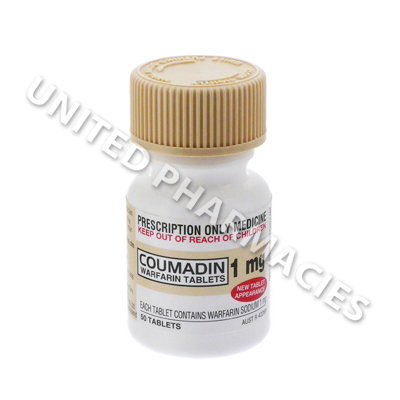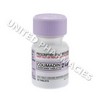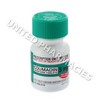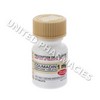Customers also like
Coumadin (Warfarin Sodium) - 2mg (50 Tablets)
from only £8.48
Coumadin (Warfarin Sodium) - 5mg (50 Tablets)
from only £3.39
Pletoz (Cilostazol) - 50mg (10 Tablets)
from only £4.72
Plavix 75 (Clopidogrel Bisulfate) - 75mg (14 Tablets)
from only £11.99
Xarelto (Rivaroxaban) - 10mg (10 Tablets)
from only £20.78
Xarelto (Rivaroxaban) - 20mg (28 Tablets)
from only £59.10
Description
| Main Use | Active Ingredient | Marketed Name |
| Preventing blood clots | Warfarin Sodium | Coumadin |
Uses
Coumadin (Warfarin Sodium) is used to prevent blood clots. In particular, those considered to be at risk of blood clots, such as people suffering from rheumatic heart disease, atrial fibrillation, patients with prosthetic heart valves and other risk factors, are treated with this drug. It may also be used to treat and prevent deep vein thrombosis and pulmonary embolism.
This drug is a type of anticoagulant (sometimes known as a blood thinner). It works by blocking the action of vitamin K. This vitamin is needed for the production of the proteins that help the blood to clot. Without these proteins, blood clots are less likely to occur.
Dosage and Administration
Coumadin (Warfarin Sodium) tablets are taken by mouth. The right dosage can vary greatly from patient to patient, and depends on the medical condition you are treating, as well as other factors. A medical assessment will be required by your doctor before prescribing this drug. You must only take the amount your doctor prescribes to you.
In some cases, adult patients being treated for the first event of deep vein thrombosis have been told to take 2mg to 5mg per day. After 1 to 2 days, the prescribing doctor may adjust the dosage, and the patient will be prescribed a dosage which can range from 2mg to 10mg per day. The dosage requirements for other conditions will vary, and all patients must closely follow the instructions given to them by their doctor.
Side effects
Patients may notice side effects when taking Coumadin (Warfarin Sodium) tablets. Ask your doctor if you are concerned about this. Some examples of possible reactions include:
- Tiredness
- Pale skin
- Hair loss
- Feeling colder than usual
- Changes in your sense of taste
You are advised to tell the prescribing doctor about any reactions you experience after taking this medicine. Even though it is less common, there is still a possibility that severe and potentially dangerous reactions may occur. If you notice any symptoms of a serious side effect, such as inflammation of the limbs, problems moving any part of the body, numbness, a prolonged and painful erection or appetite loss, you need immediate medical attention. Other adverse reactions which have not been listed here may also occur.
Precautions
There is a slight possibility that serious (and potentially life threatening) bleeding may be caused by this drug. This is considered to be more likely when treatment starts, or if too much bleeding is noticed. Medical tests will be required by your doctor in order to decrease the risk of bleeding.
Due to the risk of bleeding associated with taking this medicine, patients are advised to use an electric razor when shaving, so as to minimize the risk of bleeding. Also, caution should be exercised when brushing teeth. You are advised to avoid using sharp objects, as well as sports and other activities where injury may occur.
Seek immediate emergency medical attention if you suffer an allergic reaction. Symptoms to watch for, which may be indicative of a reaction, include skin rashes, hives, swelling of the face or limbs, trouble breathing, and trouble swallowing.
Always use Coumadin (Warfarin Sodium) as you have been prescribed by your doctor. Never self-medicate or change your dosage without first consulting your doctor. The correct dosage can vary depending on your health, medical history, and the severity of the condition being treated.
This medication may not be safe for all patients. Before you begin using it always disclose the following to your doctor:
- If you are pregnant or breastfeeding.
- If you suffer from any allergies.
- If you suffer from any other health conditions or illnesses.
- If you are using any other medicine (including all non-prescription).
- If you are using any supplements, vitamins, or herbal products of any kind.





-Tab-50mg-UK-1s.jpg)
-14Tabs-75mg-UK-1s.jpg)
-Tab-10mg-UK-1s.jpg)
-Tab-20mg-UK-1s.jpg)



